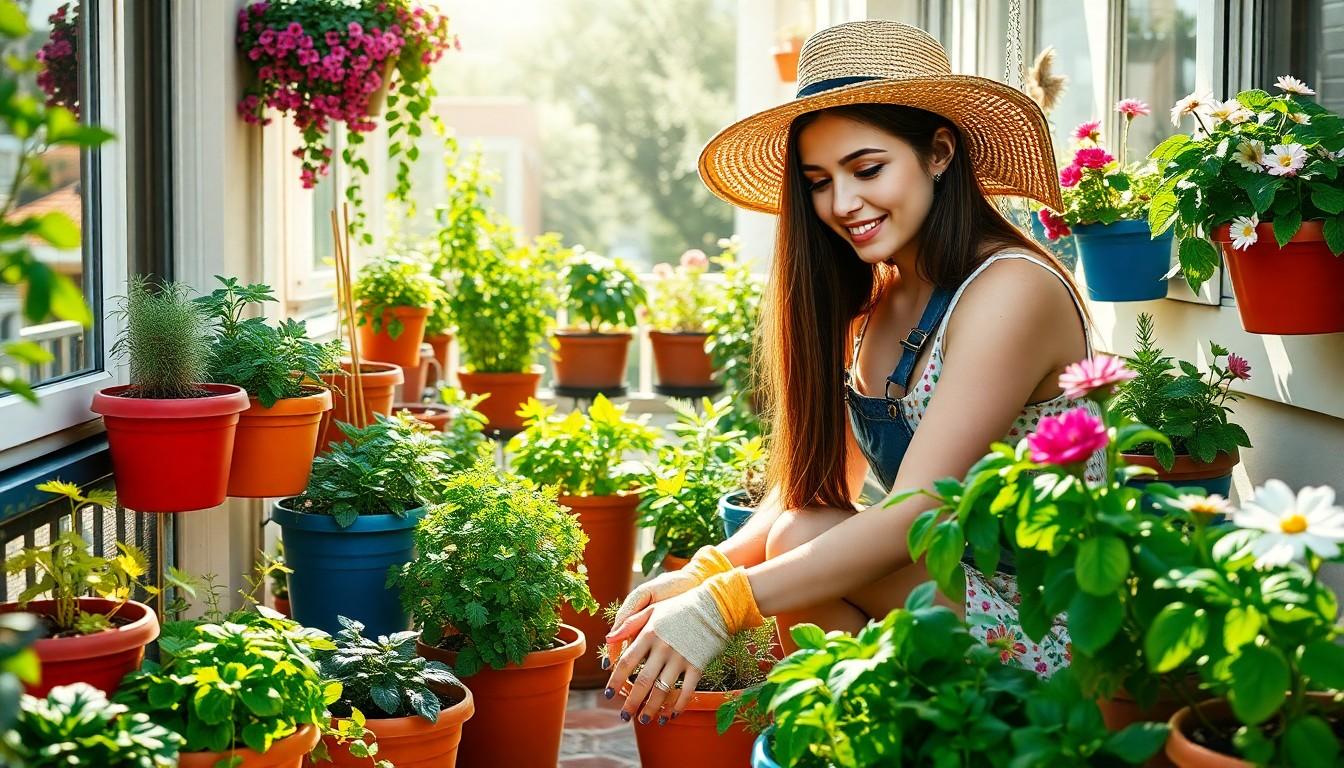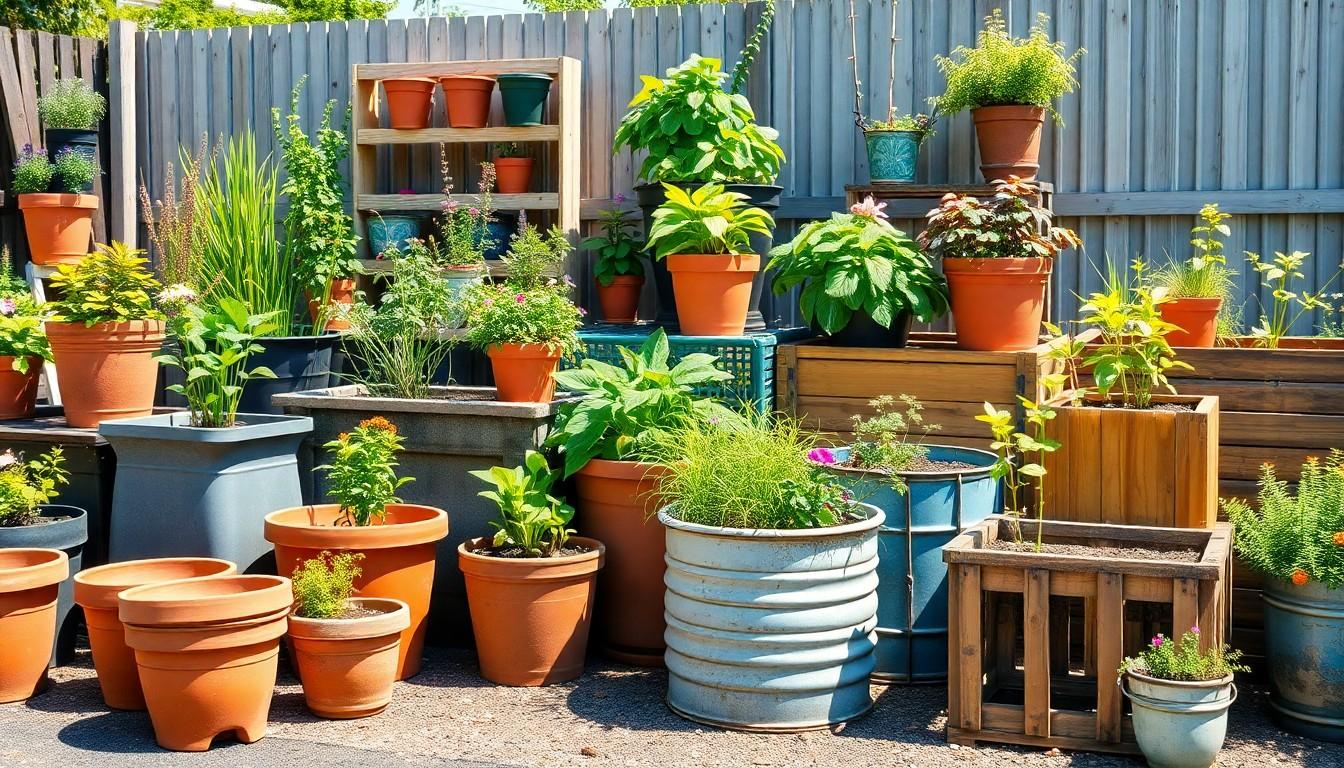Phone:
(701)814-6992
Physical address:
6296 Donnelly Plaza
Ratkeville, Bahamas.

Imagine stepping out onto your balcony or patio and being greeted by a vibrant jungle of fresh herbs and vegetables, all thriving in pots. Organic container gardening isn’t just for the green-thumbed elite; it’s a delightful way for anyone to cultivate their own little slice of nature, no matter how much space they have.
Organic container gardening involves growing plants in pots or containers without synthetic fertilizers or pesticides. This method offers flexibility for various living situations, making it perfect for those with limited outdoor space.
Organic container gardening encompasses cultivating herbs, vegetables, and flowers in non-toxic, eco-friendly environments. Containers can range from traditional pots to repurposed materials, ensuring accessibility for all gardeners. Soilless mixtures provide excellent drainage and nutrient retention, allowing plants to thrive. This approach emphasizes sustainability by using organic practices, promoting healthier plants and reducing environmental impact.
Organic container gardening offers numerous advantages. First, it provides better control over soil quality, minimizing weeds and pests. Second, it allows for greater flexibility in placement, enabling gardeners to optimize sunlight and climate conditions. Third, it promotes biodiversity by encouraging beneficial insects and pollinators. Additionally, growing food in containers can be more manageable, reducing strain on the gardener. Finally, harvesting fresh produce from a personal garden enhances culinary experiences and promotes healthier eating habits.

Selecting appropriate containers plays a crucial role in successful organic container gardening. The right containers can enhance plant growth and ensure a thriving garden.
Various types of containers support diverse gardening needs. Clay pots offer porous qualities that promote airflow, while plastic containers are lightweight and come in numerous designs. Wooden boxes create a rustic aesthetic but require treatment to prevent rot. Metal containers encourage a modern look but can heat up quickly, impacting root health. Repurposed materials, like old buckets or wine crates, also add a unique touch and are environmentally friendly. Each option presents distinct benefits, allowing gardeners to choose according to their style and the plants they wish to grow.
Container size significantly influences plant health. Larger containers provide ample space for roots to spread, promoting robust growth. Smaller pots, while easier to manage, may restrict root development and moisture retention. Ensuring good drainage is equally important. Pots with drainage holes allow excess water to escape, preventing root rot. Adding a layer of gravel at the bottom of containers can further enhance drainage. Together, size and drainage contribute to a successful organic garden, fostering healthy plants and vibrant yields.
Choosing organic soil and fertilizers is essential for successful organic container gardening. Quality soil provides nutrients and support for healthy plant growth.
Organic soil enhances the growth potential of plants. It contains essential nutrients and beneficial microorganisms, promoting a thriving ecosystem. Incorporating compost improves soil structure, enriches nutrients, and enhances water retention. Natural materials, such as peat moss and coconut coir, provide an excellent base for container gardening. Organic soil also encourages earthworm activity, which aerates the soil and improves drainage. Healthy soil fosters vibrant plants while reducing the likelihood of pests and diseases.
Organic fertilizers vary in composition and application methods. Common types include compost, well-rotted manure, and fish emulsion. Compost offers a balanced blend of nutrients and microelements, improving soil health. Rotted manure enriches soil and adds organic matter, supporting plant growth. Fish emulsion provides a quick nutrient boost, ideal for container plants. Additionally, bone meal and blood meal supply phosphorus and nitrogen, respectively, promoting root development and overall vigor. Selecting the right fertilizer based on plant needs ensures healthy, bountiful harvests.
Selecting the right plants is crucial for successful organic container gardening. This ensures that each container thrives and meets the gardener’s needs efficiently.
Tomatoes rank high as popular container vegetables, thriving in sunny spaces. Peppers perform well, offering vibrant colors and intense flavors. Lettuce varieties grow quickly, providing a fresh salad option in small spaces. Radishes mature fast, making them ideal for quick harvests. Carrots can flourish in deeper containers, adding versatility to the garden. Choosing smaller or compact determinate tomato varieties enhances productivity in limited spaces.
Basil excels in containers, attracting pollinators and adding flavor to dishes. Parsley grows easily, thriving in partial shade and full sun alike. Chives provide a mild onion flavor and thrive in various conditions. Mint can become invasive, so planting it in a separate container prevents overcrowding. Thyme brings a robust flavor, making it an excellent choice for cooking. Rosemary, with its aroma and culinary uses, does well in larger pots with good drainage.
Maintaining an organic container garden involves routine care for healthy plants. Regular attention ensures vibrant growth and bountiful harvests.
Irrigation plays a crucial role in organic container gardening. Container plants typically dry out faster than those in the ground. To maintain moisture, water deeply but infrequently, ensuring the soil remains consistently damp without becoming waterlogged. Early mornings or late afternoons represent ideal times for watering, minimizing evaporation. The use of self-watering containers can aid in regulating moisture levels, benefiting busy gardeners. Checking the soil moisture level with fingers offers a direct method, confirming whether plants require hydration.
Effective pest control remains essential for organic container gardens. Handpicking pests like aphids and caterpillars presents a quick and environmentally friendly solution. Additionally, introducing beneficial insects such as ladybugs or lacewings naturally reduces pest populations. Neem oil or insecticidal soap serves as effective treatments for serious infestations, suitable for various pests. Maintaining healthy plants through proper care and nutrient management strengthens pest resistance. Lastly, crop rotation within containers may prevent the build-up of specific pests and diseases, contributing to a flourishing garden.
Organic container gardening offers a rewarding way to connect with nature while maximizing limited space. By choosing the right containers and nurturing plants with organic practices, anyone can cultivate a vibrant green oasis. The joy of watching plants thrive and the satisfaction of harvesting fresh produce enrich everyday life.
With mindful attention to soil quality and pest management, gardeners can create sustainable environments that not only benefit their health but also the planet. Embracing this gardening method opens doors to creativity and sustainability, making it an ideal choice for both seasoned gardeners and beginners alike.